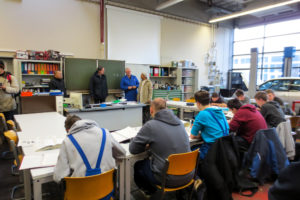
Strengthening the Internal Market
Project is comprised of six components, as follows: Component 1: Improving the strategic, legislative and institutional framework in area of Free Movement of Goods Component 2: Improving the strategic, legislative and institutional framework in area of Free Movement of Services. Component 3: Improving the legislative alignment with the

Increasing Attractiveness, Inclusiveness and Relevance of VET and Adult Education
The overall objective is to improve skill matches of youth and adults in line with labour market needs by increasing access to quality vocational education, training and adult education. The project supports the Ministry of Education and Science of the Republic of Nort Macedonia and related national educational

Technical Assistance for the Sector Reform Contract EU for Youth
The project’s overall objective is to improve young people’s vocational qualifications, skills, and preparedness to enter the labour market and better implement the Youth Guarantee scheme in the Republic of North Macedonia.

Technical Assistance for Border Enforcement of Intellectual Property Rights (IPR) for Modernization of Turkish Customs Administration VIII
It is essential to modernize customs legislation and practices in line with the EU standards for proper and effective implementation of the Union Customs Code. In this context, the purpose of the project was to improve the administrative capacity of the Turkish Customs Administration, raise awareness and increase

Skills Development and Innovation Support Project
The labour market demands quick responses to changes in the market and the demographic situation. Within this scope, the assignment aimed to provide technical assistance to the Government of Macedonia and the Ministry of Education and Science (MOES) to reform the 4-year Secondary Technical and Vocational Education and

Technical Assistance for Promoting Decent Future of Work Approach with a Focus of Gender Equality
The objective of the contract is to strengthen the institutional capacity of the Department of Employment Policies (DEP) of the General Directorate of Labour (DG Labour) in the MoLSS, its relevant stakeholders, social partners and NGOs within the scope of decent future of work approach with a focus

